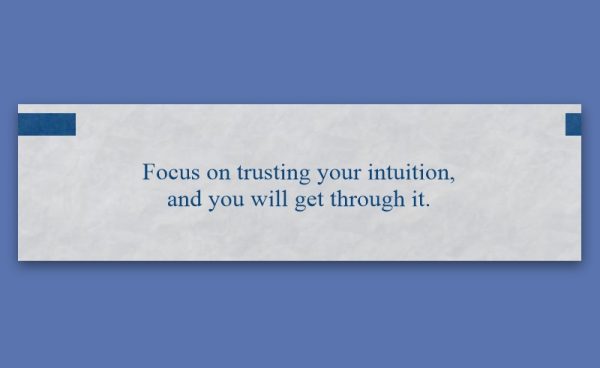Fortune Cookie Friday: Go With Your Gut
Making decisions can be challenging sometimes, but we have multiple tools to help us.
We can get advice from a friend or expert, research what others have done, or even flip a coin. We can also use our knowledge and experiences to help us narrow possible options to that final pick. Sometimes, tapping into intuition is the solution.
Intuition, the faculty of knowing or understanding something without reasoning or proof1, can be a great asset, and it’s good that we develop it so early in life.

Research shows that intuition can begin as early as 12 months old2. It’s possible that it helps us understand the world around us as we learn to walk, talk, and navigate the complexities of life. As we get older, our experiences can fine-tune our intuition.
Interestingly, our intuition involves more of our body than just our brain. According to Rollin McCraty and his colleagues at the HeartMath Research Center in Boulder Creek, CA, the heart plays a part in our intuition, too3. In fact, the heart kicks in first.
Information from intuition stirs the heart, travels to the brain, and then down to our gut—hence that gut feeling. The vagus nerve, the longest nerve of the autonomic nervous system, connects all three organs. The autonomic nervous system regulates bodily functions and acts largely unconsciously. This system is also the primary mechanism in control of the fight-or-flight response.
Now, the fight-or-flight response is found in many animals and is a primitive survival mechanism. When we perceive a threat, the brain activates the fight-or-flight response, flooding our bodies with stress hormones that prepare us to confront the danger or run like the dickens.

Unfortunately, those same hormones interfere with our intuitive process. If we want to tap into our intuition, the last thing we should do is panic. Intuition requires us to tune into the subtle signals our bodies send out. This is why we shouldn’t attempt to make decisions when stressed.
People who work in stressful jobs, such as emergency personnel, practice specific emergency tasks over and over again so that their response becomes automatic when the situation arises. There isn’t time to hem and haw over what to do, and the urgency compromises their decision-making ability.
Many of us don’t have to deal with emergencies most of the time, so we can tap into our intuition more often, and we should. The more we use it, the better it functions.
Our experiences in life get stored away in our brains; tapping into them with intuition can help us form a better, more personal connection with the world. Intuition is not completely infallible, but even if we have other decision-making tools at our disposal, going with our guts may be the way to go.
Citations
1. The American Heritage® Dictionary of the English Language, 5th Edition
2. Cesana-Arlotti N, Téglás E, Bonatti LL. The probable and the possible at 12 months: intuitive reasoning about the uncertain future. Adv Child Dev Behav. 2012;43:1-25. doi: 10.1016/b978-0-12-397919-3.00001-0. PMID: 23205406.
3. McCraty R, Atkinson M, Bradley RT. Electrophysiological evidence of intuition: part 1. The surprising role of the heart. J Altern Complement Med. 2004 Feb;10(1):133-43. doi: 10.1089/107555304322849057. PMID: 15025887.




